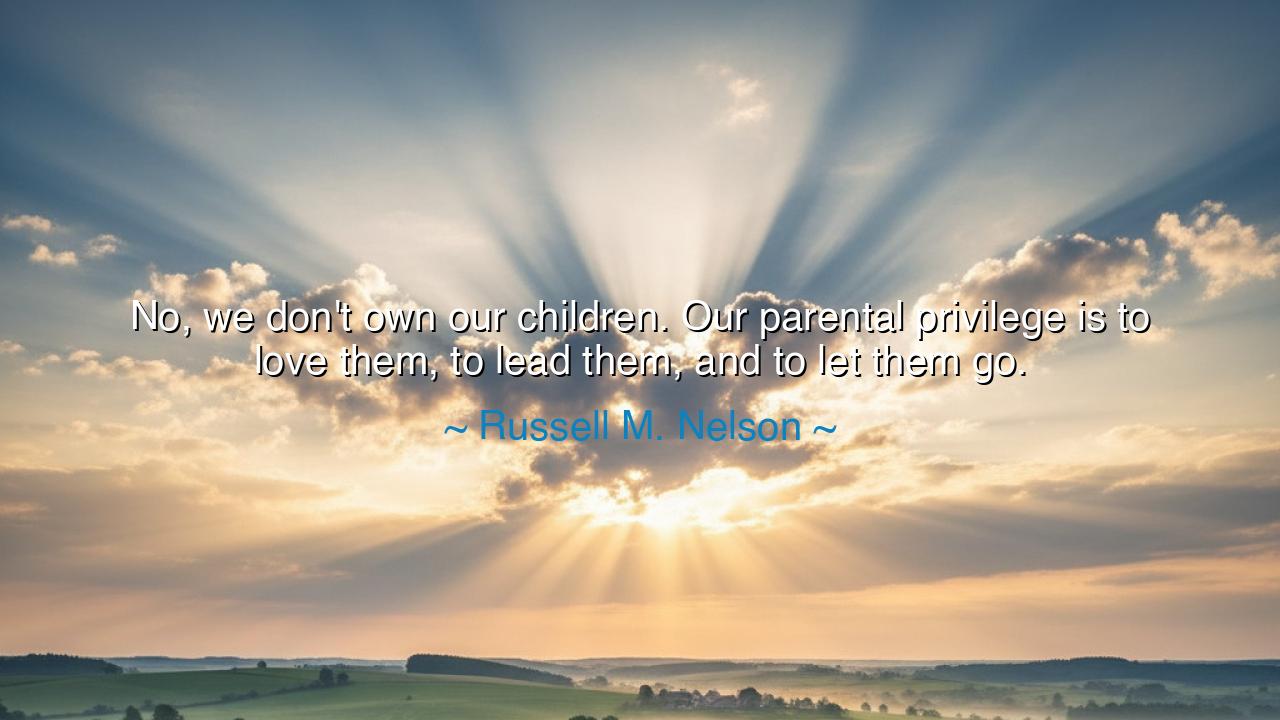
No, we don't own our children. Our parental privilege is to love
No, we don't own our children. Our parental privilege is to love them, to lead them, and to let them go.






“No, we don’t own our children. Our parental privilege is to love them, to lead them, and to let them go.” Thus spoke Russell M. Nelson, a man of faith and wisdom, whose words carry the weight of eternity and the tenderness of a father’s heart. In this truth lies a lesson as ancient as the dawn: that the bond between parent and child is not one of possession, but of stewardship — a sacred trust given for a time, to nurture a soul that ultimately belongs not to us, but to God, to life, to itself.
In every generation, parents are tempted to hold their children as extensions of their own dreams, shaping them according to their fears or ambitions. Yet Nelson reminds us that love is not ownership. To love a child rightly is to prepare them for freedom, not to keep them in dependence. The parent’s task is not to mold a reflection of themselves, but to guide a living flame that must one day burn on its own. To love, to lead, and to let go — these are the three divine acts of parenthood, each one harder, and holier, than the last.
To love is the beginning. It is the soil in which the soul first takes root. A child’s heart blossoms in the warmth of affection, in the safety of being seen, cherished, and accepted. This love is not mere sentiment, but an act of daily devotion — patience in chaos, gentleness in correction, faith amid worry. Through love, a parent mirrors the Creator’s tenderness, teaching the child that the world, though vast and uncertain, can still be kind.
To lead is the calling. Every child walks through a wilderness of choices, and the parent must be a compass — not by force, but by example. Leadership in the home is not domination; it is light. It is the wisdom to set boundaries without breaking spirit, to teach discipline without extinguishing joy. The true parent does not demand perfection, but inspires it by walking in integrity and humility. As Nelson said, parental privilege is not power — it is service, the sacred work of guiding another soul toward truth.
And finally, to let them go — this is the final act of courage, the test that breaks the heart and completes it. To let go is not to cease loving, but to trust the seeds one has planted. The parent who releases the child into the world performs the highest form of faith: faith that the love and lessons given will endure, even when distance or time separates them. To cling is to smother; to release is to honor the freedom that life demands.
Consider the story of Hannah, from the ancient scriptures, who longed for a child and, when her prayer was answered, dedicated her son Samuel to God. She loved him fiercely, yet she kept her vow to release him, trusting that he would fulfill a greater purpose beyond her reach. Her sacrifice became her sanctification, for she understood that children are not possessions but pilgrim souls, given to us for a brief season so that we might teach them to walk toward their own destinies.
Nelson’s words are not merely for parents, but for all who love deeply. Every act of love requires a letting go. We must release what we cherish into the freedom of its own becoming. This is the rhythm of divine love: it embraces, it guides, and then it trusts. Love without freedom is control; leadership without humility is tyranny; parenthood without release is bondage. The highest love is one that liberates.
So, O keepers of the next generation, let this wisdom take root within you. Love your children fiercely, for they are miracles entrusted to your care. Lead them wisely, that they may walk in truth even when you are gone. And when the time comes, let them go, for only in their flight can your love fulfill its purpose. For the greatest gift a parent can give is not possession, but freedom — and the assurance that, wherever their children roam, they were loved enough to stand, to choose, and to soar.






AAdministratorAdministrator
Welcome, honored guests. Please leave a comment, we will respond soon